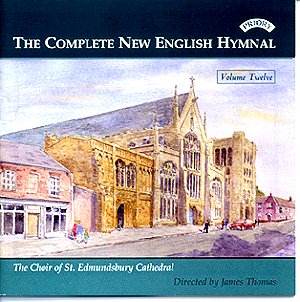





Judge eternal, throned in splendour (Hymn 490) [1’54]
Wds. Scott Holland. Tune: Rhuddlan (Welsh trad.) (1749)
O come, O come, Emmanuel (Hymn 11) [5’24]
Wds. 9th. Cent. (trans. J.M.Neale) Tune: French missal melody ed. Arnold (1933)
Hark! the herald angels sing (Hymn 26) [4’01]
Wds. Chas. Wesley. Tune: Mendelssohn, arr. W.H.Cummings
The heavenly Word proceeding forth (Hymn 269) [3’19]
Wds. 10th. Century Advent hymn, trans. J.M.Neale. Tune: Verbum Supernum (trad)
The great God of Heaven (Hymn 37) [3’59]
Wds Henry Bramley. Tune: A Virgin unspotted (trad. harm. Martin Shaw)
Come, ye faithful, raise the anthem (Hymn 351) [3’12]
Wds. Job Hupton. Tune: Neander (1680)
Brightest and best (Hymn 49) [2’52]
Wds. Bishop Heber. Tune: Wessex (Alwyn Surplice)
Jerusalem, thou city blest (Hymn 228) [2’30]
Wds. editors. Tune Newbury (arr. Vaughan Williams).
Songs of thankfulness and praise (Hymn 56) [3’52]
Wds. Christopher Wordsworth. Tune: St. Edmund (Chas. Steggall) (1849)
Jesu, lord of life and glory (Hymn 68) [3’33]
Wds. John Cummins. Tune: St. Raphael (E.J.Hopkins) (1867)
Love’s redeeming work is done (Hymn 113) [2’06]
Wds. Chas. Wesley. Tune: Savannah (Moravian M/S)
Christ the Lord is risen again! (Hymn 105) [3’06]
Wds. Lyra Germanica (trans. Catherine Winkworth). Tune: St.Martin (arr. Vaughan Williams)
For all the Saints (Hymn 197) [5’24]
Wds. Bishop How. Tune: Sine Nomine (R. Vaughan Williams)
O word of God above (Hymn 211) [2’50]
Wds. Chas. Guiet. Tune: St. Edmund (?Edmund Gilding) (1762)
Immortal love for ever full (Hymn 378) [3’51]
Wds. John Whittier. Tune: Bishopthorpe (Jeremiah Clarke)
Thy Hand, O God has guided (Hymn 485) [4’17]
Wds. Edward Plumptre. Tune: Thornbury (Basil Harwood) (1898)
With Christ we share a mystic grave (Hymn 317) [2’11]
Wds. ?J.M.Neale. Tune: St. Stephen’s Tune (William Jones) (1789)
Thee we adore, O hidden Saviour, thee (Hymn 308) [2’35]
Wds. St. Thomas Aquinas. Tune Adoro te (Plainsong) (1697)
Thou to whom the sick and dying (Hymn 325) [3’04]
Wds. Godfrey Thring. Tune: Albert (Heinrich Albert) (1642)
Beyond all mortal praise (Hymn 340) [2’41]
Wds. Timothy Dudley-Smith. Tune: Marlborough Gate (Wayne Marshall)
Jesu, good above all other (Hymn 387) [2’34]
Wds. Percy Dearmer after J.M.Neale. Tune: Quem pastores (arr. R. Vaughan Williams)
We have a gospel to proclaim (Hymn 486) [3’34]
Wds. Edward Burns. Tune: Fulda (William Gardiner)(1815)
Organ and Assistant Choirmaster Michael Bawtree
Recorded on 4-5 March 2002 in St.Edmundsbury Cathedral, Bury St. Edmunds, Suffolk.
BUY NOW